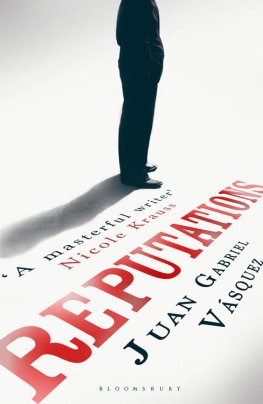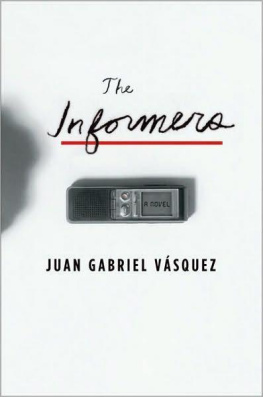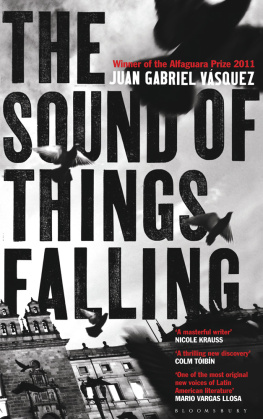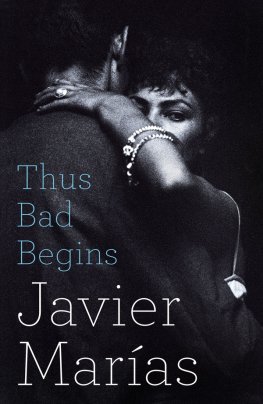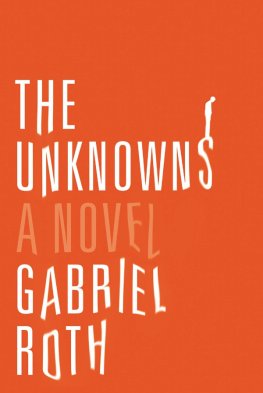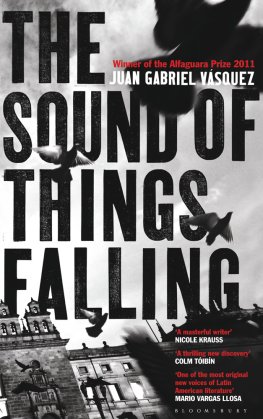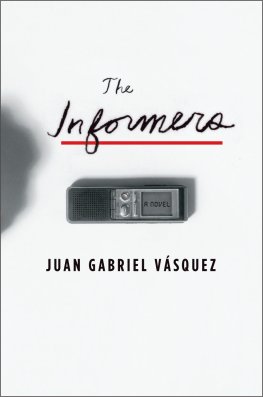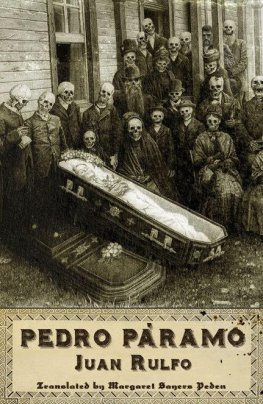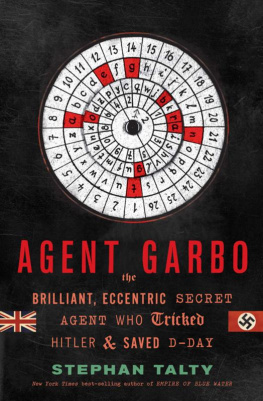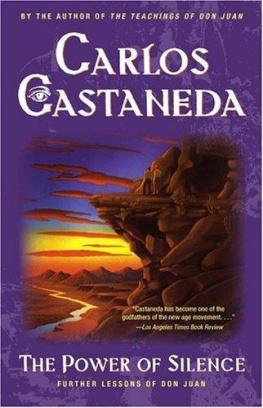Juan Gabriel Vsquez
Reputations
For Justin Webster and Assumpta Ayuso
Identical noses do not make identical men.
Rodolphe Tpffer, Essai de physiognomonie
Sitting on a bench in Parque Santander, having his shoes shined before it was time for the tribute to begin, Mallarino was suddenly sure hed just seen a long-dead political cartoonist. He had his left foot on the wooden crate and his back pressed against the cushion, so his old hernia wouldnt start acting up, and hed been letting the time slip by reading the local tabloids, the cheap newsprint blackening his fingers and the huge red headlines telling him of bloody crimes, sexual secrets, aliens abducting children from barrios on the south side. Reading the tabloids was a sort of guilty pleasure: something he only allowed himself when nobody was looking. Thats what Mallarino was thinking about the hours hed wasted here, given over to this perversion beneath the pale sunshades when he looked up, away from the words as one does to remember, and finding his gaze met by the tall buildings, the ever-grey sky, the trees that had always been cracking the asphalt, feeling as though he were seeing it all for the first time. And then it happened.
It was just a fraction of a second: the figure crossed Seventh Avenue in his dark suit, untidy bow tie and broad-brimmed hat, and then turned the corner beside San Francisco Church and disappeared forever. In an effort not to lose sight of him, Mallarino leaned forward and stepped off the crate just as the bootblack was about to apply the shoe polish to the leather, and left an oblong mark on his grey sock: a black eye looking up at him from below accusingly, like the mans half-closed eyes. Mallarino, who until now had only seen the bootblack from above the shoulders of his blue overalls speckled with fresh dandruff, the crown cleared by an encroaching baldness found himself facing a veiny nose, small protruding ears and a moustache that was white and grey, like pigeon shit. Sorry, said Mallarino, I thought Id seen someone. The man went back to his work, the well-aimed strokes of his hand applying shoe polish to the instep. Hey, he added, could I ask you a question?
Go ahead, chief.
Did you ever hear of Ricardo Rendn?
Silence reached him from below: one beat, then a second.
Doesnt ring a bell, sorry, said the man. If you want we can ask my colleagues after.
His colleagues. Two or three of them were already starting to pack up their things. They were closing up chairs, folding cloths, putting brushes with scuffed-up bristles and dented tins of shoe polish away in their wooden crates, and the air, beneath the commotion of the evening traffic, filled with the banging of metal fitting together and lids being screwed on tightly. It was ten to five in the afternoon: since when had Bogots bootblacks worked fixed hours? Mallarino had drawn them on a few occasions, especially in the early days, when coming downtown and going for a stroll and having his shoes shined was a way of taking the citys pulse, of feeling that he was a direct witness of his own material. All that had changed: Mallarino had changed; the bootblacks had changed too. He almost never came into the city any more, and had grown used to seeing the world on screens or pages, to letting life come to him instead of hunting it down in its hiding places, as if hed gradually realized that hed earned this and now, after so many years, it was life that should come looking for him. The bootblacks, for their part, no longer ruled their workplaces those two square metres of public space by virtue of a pact of honour, but rather by belonging to a union: the payment of monthly dues, the possession of a laminated identity card, which they displayed at the slightest provocation. Yes, the city was different now. But it wasnt nostalgia that overwhelmed Mallarino as he noted the changes, but a strange desire to hold back the march of chaos, as if doing so would also hold back his own interior entropy, the slow oxidation of his organs, the erosion of his memory reflected in the citys eroded memory: as exemplified by the fact that nobody knew who Ricardo Rendn was anymore. Ricardo Rendn: the greatest political cartoonist in Colombian history, who had just walked by in spite of having been dead for seventy-nine years, had been devoured, like so many other figures, by the insatiable hunger of oblivion. Theyll forget me too one day, thought Mallarino. As he lowered his foot off the crate and raised the other one in its place, and as he shook the paper so that a wrinkled page would return to its proper place (a dexterous flick of the wrists), Mallarino thought: Yes, theyll forget me too. Then he thought: But not for quite a while yet. And in that moment he heard himself say: What about Javier Mallarino?
The bootblack took a second to realize the question was directed at him. Sir?
Javier Mallarino. Do you know who he is?
The guy who does the cartoons for the newspaper, the man said. But he doesnt come around here any more. He got tired of Bogot, thats what I was told. Hes been living out of town for ages now, up in the mountains.
So theres something that was still remembered. It shouldnt have surprised him: his move at the beginning of the 1980s, before the years of terrorism had even begun and people had fewer reasons for leaving, had been national news. Waiting for the bootblack to say something, a question or some exclamation, Mallarino stared at the bald spot on the top of his head, that devastated territory with the odd strand of hair popping up here and there, with marks revealing the hours spent out in the sun: potentially cancerous spots, the place where a life might begin to be extinguished. But the man didnt say anything more. He hadnt recognized him. In a few minutes Mallarino would receive the definitive consecration, the orgasm corresponding to a forty-year-long intercourse with his trade, and this had not ceased to surprise him: people didnt recognize him. His political cartoons had turned him into what Rendn had been in the 1930s: a moral authority for half the country, public enemy number one for the other half, and for all of them a man able to cause the repeal of a law, overturn a judges decision, bring down a mayor or seriously threaten the stability of a ministry, and all this with no other weapons than paper and Indian ink. And nevertheless on the street he was nobody, he could go on being nobody, since cartoons, as opposed to columns these days, were never accompanied by a photo of their perpetrator: for the average reader out on the street it was as if they drew themselves, free of any authorship, like a downpour, or an accident.
The guy who does the cartoons. Yes, that was Mallarino. Cartoon-obsessed monomaniac: thats what hed been called once, in a letter to the editor, by a politician whose vanity hed wounded. Now his eyes, always tired, gazed at the inhabitants of downtown Bogot: the lottery-ticket seller resting on the stone wall, the student waiting for a bus, walking north and looking over his shoulder, the couple stopped in the middle of the pavement, man and woman, both office workers, both dressed in dark blue suits with white shirts, holding both each others hands but not looking at each other. All of them would react at the mention of his name with admiration or repugnance, never with indifference but none of them would be able to identify him. If he committed a crime, none of them could pick him out of a police line-up of usual suspects: Yes, Im sure, its number five, the bearded one, the thin one, the bald one. Mallarino, for them, didnt have particular features, and the few readers whod met him over the years often commented with surprise: I hadnt imagined you bald, or thin, or bearded. His was the kind of baldness that didnt call attention to itself; when he met someone hed only seen once before, Mallarino often received the same disconcerted comments: Have you always looked like that? Or: How strange. I didnt notice when we met. Maybe it was his expression, which devoured peoples attention the way a black hole devours light: his eyes with drooping lids looking out from behind his glasses with a sort of permanent sadness, or that beard that hid his face like an outlaws bandana. His beard used to be black; it was still full, but had gone grey: slightly more at the chin and sideburns, slightly less on the sides of his face. It didnt matter: it kept him hidden. And Mallarino was still unrecognizable, an anonymous being on the teeming streets. That anonymity gave him a puerile pleasure (a child hiding in forbidden rooms), and had calmed Magdalena, his wife back then. In this country they kill people for less, she used to say to him when a general or a drug baron came off badly in one of his drawings. Its better that no one knows who you are or what you look like. Its better that you can go out and buy milk and I wont worry if you take your time.

